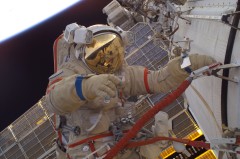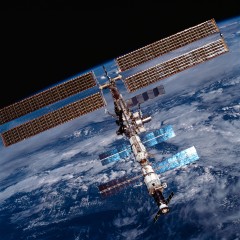Space Walk
 The bright orange piping on his Orlan space suit made the glowering Russian cosmonaut look like he had stepped directly out of a 1970s science fiction flick. He held the suit’s helmet casually by fingertip, bouncing it between his legs. The tight-fitting communication cap emphasized his gaunt facial features and with his thousand yard stare he could have been Kirk Douglass from Paths of Glory.
The bright orange piping on his Orlan space suit made the glowering Russian cosmonaut look like he had stepped directly out of a 1970s science fiction flick. He held the suit’s helmet casually by fingertip, bouncing it between his legs. The tight-fitting communication cap emphasized his gaunt facial features and with his thousand yard stare he could have been Kirk Douglass from Paths of Glory.
Our knees nearly touched in the cramped confines of the ISS (International Space Station) airlock. I gave him a warm smile, trying to show him I wasn’t scared. He twisted his face into an exasperated grin.
He’s cursing his luck, having to babysit a novice during her first real EVA (Extravehicular Activity).
The other Russian (Mikhail was it?) was scratched after he suffered from decompression sickness when returning from his third mission in as many days. We locked him in the airlock and pumped it with pure oxygen until he recovered, laughing uncontrollably and pulling at his skin until it was covered in dark splotches. The astronaut sitting across from me locked his helmet into place and gave me a sign that he was ready. I double-checked the control panel of my EMU (Extravehicular Mobility Unit) and gave a thumbs-up of my own.
I wonder how many hours of EVA he has logged. The Russians probably don’t keep track, unlike those air jockeys at the JSC who compare flight times as if they were penis size.
“I’ve logged over a thousand hours in a SR-71 Blackbird, what makes you think you are qualified to be an astronaut?”
The Colonel’s stare made me feel like the naive fresh-faced young girl he must have thought I was. He was holding my CV between two fingers while he asked this question; the answer was there if he took the time to look. PHD in Physics from the University of Chicago, post doctorate experience at CERN, as the youngest female selected for Astronaut Candidate training I scored top marks on the SMS (Shuttle Mission Simulator).
And although I explained this all to him as diplomatically as I could he concluded the interview by saying.
“Jesus Christ. At least do you speak Russian?”
I was wishing I had learned to speak Russian right about now. The astronaut sitting in the airlock across from me (was it Andrei?) undoubtedly spoke perfect English, but he chose not to, speaking Russian quickly into his radio transmitter instead.
What the hell am I doing here?
I’ve trained countless hours in computer simulators and enormous pools of water, I’ve been spun by a centrifuge during High-G training, and experienced weightlessness in the “vomit comet“, but nothing can prepare you for leaving the safety of the ISS for the first time with nothing but fabric and plastic between you and the void.
The Russian pulled a lever and the air began evacuating from the airlock. We watched until a blinking amber bulb turned green, indicating the pressure had equalized, and then released the locks on the outer pressure door.
An angry hiss was our only warning that something had gone horribly wrong. If the airlock had properly evacuated there would have been no noise, only comforting radio chatter from mission control. The airlock had failed to vent properly and the explosive decompression blew us out into space.
My leg throbbed, I had clipped the pressure door on the way out. I could only hope that the tough outer layer of Kevlar had prevented a tear in my suit’s air bladder. I suddenly remembered I was rocketing away from the ISS at high speed. I couldn’t see the station from my orientation so I engaged a switch and manipulated a joystick at my belt. The SAFER (Simplified Aid for EVA Rescue) jet pack shot out streams of compressed Nitrogen. There it was, spinning in my view a hundred meters away, and getting further every second.
Now, where is the Russian?
 When I twisted the controls and turned to my left the planet Earth drifted into view. This was entirely unlike the glimpses I caught through porthole windows on the station, it was just me and the Earth stretching out big and blue beneath me. It took my breath away and for a moment I forgot the horrible danger I was in.
When I twisted the controls and turned to my left the planet Earth drifted into view. This was entirely unlike the glimpses I caught through porthole windows on the station, it was just me and the Earth stretching out big and blue beneath me. It took my breath away and for a moment I forgot the horrible danger I was in.
I caught a glimpse of the Russian about 20 yards above and to my left and maneuvered myself closer to him. The light of the sun lit up his face. He wasn’t moving and his eyes were closed. I glimpsed a patch on the breast of his suit embroidered with his name. Ekomov, M. (Ah, it’s Mikhail.) I hoped I would get a chance to speak with him again now that I knew his name. Hooking a carabiner at the end of a safety line onto one of his belt loops I turned back toward the station.
We were now 200 meters away and retreating rapidly. I risked a long blast from the nitrogen canisters which slowed our momentum and, finally, reversed our direction. The four small tanks in the pack at my lower back were about the size of Coke bottles and not meant for extended maneuvers far from the station. A final blast exhausted the tanks and we floated, powerless, slowly toward the station.
The return trip was nerve-wracking, with 8+ hours of life support we were in no immediate danger but, without power, we were helpless, if I had miscalculated our trajectory a minuscule amount we would float right by the station with no ability to correct the course. And, as we got closer, it looked as if this might be the case.
As we approached within 50 yards of the station it was clear that we were going to pass directly over it, within 10 meters, but with no way to gain purchase, it may as well have been 10 miles. In desperation I yanked Mikhail closer to me and searched his suit for evidence of a Soviet SPK, the Orlan’s equivalant of SAFER. Nothing, and even if I had found the controls I wasn’t trained in its use, I would likely make things worse. We were going to drift slowly by the station into deep space and then, when our oxygen tanks ran dry, we would die.
 We floated over cylindrical nodules, making up the body of the station, large plates of solar arrays extended like wings, looking everything like a dragonfly in flight. As we passed over the Russian Segment, I caught movement in the corner of my eye. The European Robotic Arm was extending rapidly toward us. I reached out and wrapped my arms around the aluminum limb and, with relief, let it pull us in.
We floated over cylindrical nodules, making up the body of the station, large plates of solar arrays extended like wings, looking everything like a dragonfly in flight. As we passed over the Russian Segment, I caught movement in the corner of my eye. The European Robotic Arm was extending rapidly toward us. I reached out and wrapped my arms around the aluminum limb and, with relief, let it pull us in.
